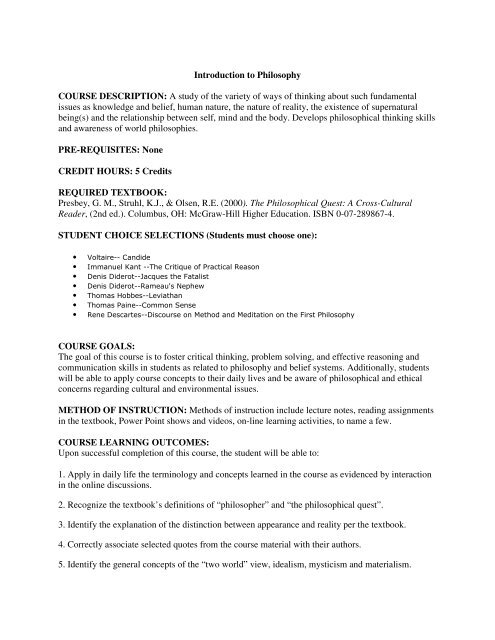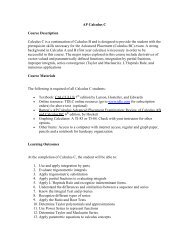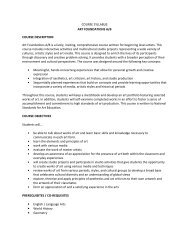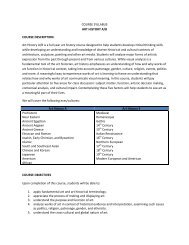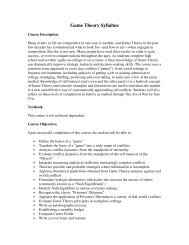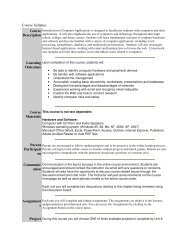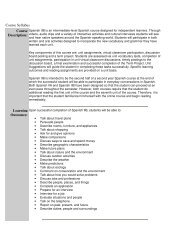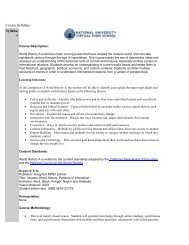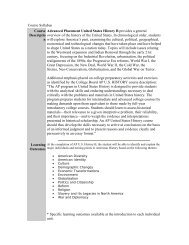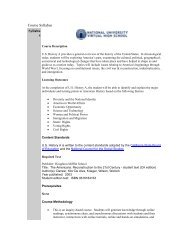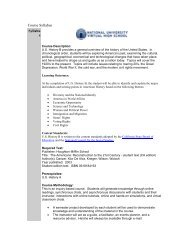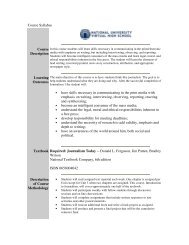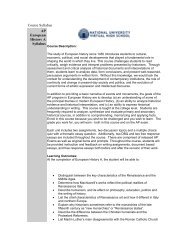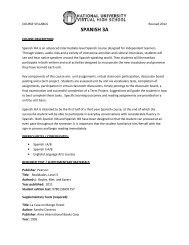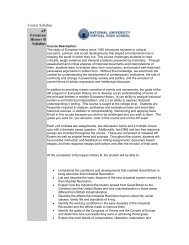Introduction to Philosophy Syllabus - National University Virtual High ...
Introduction to Philosophy Syllabus - National University Virtual High ...
Introduction to Philosophy Syllabus - National University Virtual High ...
You also want an ePaper? Increase the reach of your titles
YUMPU automatically turns print PDFs into web optimized ePapers that Google loves.
<strong>Introduction</strong> <strong>to</strong> <strong>Philosophy</strong><br />
COURSE DESCRIPTION: A study of the variety of ways of thinking about such fundamental<br />
issues as knowledge and belief, human nature, the nature of reality, the existence of supernatural<br />
being(s) and the relationship between self, mind and the body. Develops philosophical thinking skills<br />
and awareness of world philosophies.<br />
PRE-REQUISITES: None<br />
CREDIT HOURS: 5 Credits<br />
REQUIRED TEXTBOOK:<br />
Presbey, G. M., Struhl, K.J., & Olsen, R.E. (2000). The Philosophical Quest: A Cross-Cultural<br />
Reader, (2nd ed.). Columbus, OH: McGraw-Hill <strong>High</strong>er Education. ISBN 0-07-289867-4.<br />
STUDENT CHOICE SELECTIONS (Students must choose one):<br />
• Voltaire-- Candide<br />
• Immanuel Kant --The Critique of Practical Reason<br />
• Denis Diderot--Jacques the Fatalist<br />
• Denis Diderot--Rameau's Nephew<br />
• Thomas Hobbes--Leviathan<br />
• Thomas Paine--Common Sense<br />
• Rene Descartes--Discourse on Method and Meditation on the First <strong>Philosophy</strong><br />
COURSE GOALS:<br />
The goal of this course is <strong>to</strong> foster critical thinking, problem solving, and effective reasoning and<br />
communication skills in students as related <strong>to</strong> philosophy and belief systems. Additionally, students<br />
will be able <strong>to</strong> apply course concepts <strong>to</strong> their daily lives and be aware of philosophical and ethical<br />
concerns regarding cultural and environmental issues.<br />
METHOD OF INSTRUCTION: Methods of instruction include lecture notes, reading assignments<br />
in the textbook, Power Point shows and videos, on-line learning activities, <strong>to</strong> name a few.<br />
COURSE LEARNING OUTCOMES:<br />
Upon successful completion of this course, the student will be able <strong>to</strong>:<br />
1. Apply in daily life the terminology and concepts learned in the course as evidenced by interaction<br />
in the online discussions.<br />
2. Recognize the textbook’s definitions of “philosopher” and “the philosophical quest”.<br />
3. Identify the explanation of the distinction between appearance and reality per the textbook.<br />
4. Correctly associate selected quotes from the course material with their authors.<br />
5. Identify the general concepts of the “two world” view, idealism, mysticism and materialism.
6. Recognize the basic precepts of common schools of philosophical thought.<br />
7. Critically analyze and evaluate societal issues using techniques exemplified in the textbook.<br />
8. Demonstrate appreciation for the different sorts of philosophical and religious backgrounds that<br />
separate peoples of the world, past and present, by discussing relevant themes and writing discussion<br />
responses <strong>to</strong> share with classmates.<br />
COURSE REQUIREMENTS: Students are expected <strong>to</strong> complete all class activities, submit<br />
assignments on time, and complete examinations as scheduled. Failure <strong>to</strong> comply with these<br />
requirements may result in the loss of points. Minimum requirements <strong>to</strong> be met by the student should<br />
include demonstrating adequate achievement of the learning objectives listed above.<br />
DELIVERABLES:<br />
Unit 1: What is <strong>Philosophy</strong>?<br />
<strong>Introduction</strong><br />
Objectives<br />
• State in your own words what philosophy is<br />
• Identify and explain the distinction between reality and<br />
appearance<br />
• Analyze and interpret the various concepts of death<br />
offered in the readings<br />
Pre-Test<br />
Reading:<br />
Chapter 1: The Parable of the Cave, Baum, Pla<strong>to</strong>, Russel,<br />
Radhakrishnan, Sartre<br />
Lecture 1: Defining <strong>Philosophy</strong><br />
Lecture 2: Types of Inquiry<br />
Lecture 3: Development of <strong>Philosophy</strong><br />
Video: What is <strong>Philosophy</strong>?<br />
Interactivity: Thales or Parmenides<br />
Class Discussion:<br />
Concept of philosophy and how it applies <strong>to</strong> our lives.<br />
Compare and contrast two differing views of death.<br />
Assignment<br />
Baum’s views on death<br />
Additional Resources
Unit 2: Human Nature<br />
<strong>Introduction</strong><br />
Objectives:<br />
• Identify the basic theories of human nature<br />
• Clarify and analyze the distinctions between the concepts<br />
of no human nature, essential human nature, and general<br />
issues pertaining <strong>to</strong> what a human being is<br />
• Identify and analyze the basic orientations regarding the<br />
Self in the Upanishads, Hinduism and Buddhism<br />
Reading:<br />
Chinese Debate, Hobbes, Mutual Aid, War and Aggression,<br />
Beyond the Veil, Woman as Body, Sacred Hoop, Sexual Nature,<br />
Self, Mind, Body<br />
Lecture 1: Human Nature<br />
Presentation: Human Nature<br />
Video: Human Nature<br />
Interactivity: Patriarchy / Anatman<br />
Class Discussion:<br />
Discuss the concepts of human nature and the implications of<br />
being human.<br />
Human nature theories.<br />
Assignment<br />
Compare and contrast Descartes’ view of self with Hume.<br />
Quiz<br />
Additional Resources<br />
Unit 3: Metaphysics<br />
<strong>Introduction</strong><br />
Objectives:<br />
• Identify and explain the distinction between reality and<br />
appearance<br />
• Clarify and analyze the distinction between idealism and<br />
materialism
• Apply the concepts associated with idealism and<br />
materialism <strong>to</strong> issues in current culture<br />
Reading:<br />
Appearance and Reality, Idealism, Materialism<br />
Lecture 1: Where does the world come from?<br />
Presentations:<br />
Idealism<br />
Metaphysics<br />
Flash Cards: <strong>Philosophy</strong> vocabulary<br />
Assignment:<br />
Materialism vs. Idealism<br />
Class Discussion:<br />
Fundamental concepts of appearance vs. reality<br />
Black Elk and Socrates<br />
Quiz<br />
Unit 4: <strong>Philosophy</strong> of Religion<br />
Additional Resources<br />
<strong>Introduction</strong><br />
Objectives:<br />
• Identify and critique different philosophical orientations<br />
<strong>to</strong>wards religion<br />
• Identify and evaluate classical arguments for and against<br />
the existence of God<br />
Pre-Test<br />
Reading:<br />
Personal Experience of God, Transforming Reality, Critique of<br />
Religion, Liberation theology. Engaged Buddhism, Islam and<br />
Revolution, Women Need the Goddess, Proof of God’s Existence<br />
Lecture 1: <strong>Philosophy</strong> of Religion<br />
Presentation: <strong>Philosophy</strong> of Religion<br />
Flash Cards: Philosophical Vocabulary<br />
Class Discussion:<br />
Pros and cons of the existence of God
Arguments for the existence of God<br />
Assignment 1<br />
Describe the differences and similarities between the Buddhist<br />
idea of God and the Judeo-Christian idea of God<br />
Midterm Exam<br />
Unit 5: Ethics<br />
Additional Resources<br />
<strong>Introduction</strong><br />
Objectives:<br />
• Identify the basic moral concepts and ethical traditions<br />
Compare and contrast basic eastern and western views of ethics<br />
Develop a working grasp of the concepts of utilitarianism, virtue<br />
ethics, religious ethics, and feminist ethics<br />
Reading:<br />
Ethical Theory, Mill, Feminist Ethics, Buddhist Ethics, Korn,<br />
Aris<strong>to</strong>tle, Islam, Rule of Benedict, Taoism<br />
Lecture 1: Western and Eastern Approaches <strong>to</strong> Ethics<br />
Interactivity: True / False<br />
Assignment:<br />
Compare and contrast the Buddhist concept of 4 Noble Truths with<br />
Aris<strong>to</strong>tle’s concept of virtue.<br />
Class Discussion:<br />
Ethical Systems<br />
What is Ethics?<br />
Quiz<br />
Additional Resources<br />
Unit 6: Enlightenment Thinkers<br />
<strong>Introduction</strong> <strong>to</strong> the Enlightenment Period<br />
Students choose text from above list.<br />
Dialectical Journaling<br />
Class Discussion<br />
Philosophical premises in each reading selection<br />
Unit 7: Enlightenment Thinkers<br />
Corners<strong>to</strong>ne Project<br />
Students will take the concepts learned in this course: Human
Nature, Metaphysics, <strong>Philosophy</strong> of Religion, Ethics, and the<br />
Enlightenment and tie it in with their reading selection as well as<br />
applications for their lives.<br />
Students will complete a report as well as a presentation<br />
Unit 8: Final Assessments<br />
Students will submit a rough draft for credit and review.<br />
Final Exam<br />
Submission of Final Paper and Presentation<br />
Course Reflection<br />
GRADING FACTORS AND POLICY:<br />
A - Outstanding Achievement (Significantly Exceeds Standards)<br />
B - Commendable Achievement (Exceeds Standards)<br />
C - Acceptable Achievement (Meets Standards)<br />
D - Marginal Achievement (Below Standards)<br />
F – Failing<br />
STUDENT RESPONSIBILITIES:<br />
1. If you are having difficulty with the course, computer problems, or personal issues, notify the<br />
instruc<strong>to</strong>r as soon as possible.<br />
2. In order <strong>to</strong> be fair <strong>to</strong> all students in the class, the due dates for each assignment will be strictly<br />
adhered <strong>to</strong> unless mitigating circumstances warrant an extension. The instruc<strong>to</strong>r must be contacted<br />
prior <strong>to</strong> any due date <strong>to</strong> negotiate possible alternative arrangements.<br />
3. As an online learner, you are responsible for determining the pace and schedule of your<br />
coursework. Be prepared <strong>to</strong> spend a significant amount of time completing this course.<br />
4. Back up all of your work on a disk or external drive and make a hard copy. If you experience<br />
computer difficulties, you are responsible for resolving the issue.<br />
5. Cyberspace is not always reliable. For instance, e-mails sometimes get lost and servers can<br />
disconnect temporarily. Don't wait until the last moment <strong>to</strong> get things done; allow enough time <strong>to</strong><br />
meet deadlines. You are responsible for submitting your work on time.<br />
CLASS PARTICIPATION REQUIREMENTS:
This course requires the student <strong>to</strong> participate in the online discussion threads and possibly ClassLive<br />
Pro sessions.<br />
1. If responding <strong>to</strong> another student’s post, refer <strong>to</strong> that person by name.<br />
2. Unless asked about your opinion, provide a citation <strong>to</strong> support statements that are not well-known<br />
and accepted facts. Avoid saying “as everyone knows...” or presenting unsupported assertions as<br />
facts.<br />
3. Check your work for typographical and grammatical errors before submission.<br />
4. Make sure <strong>to</strong> avoid acronyms or abbreviations that are not commonly used in the general<br />
population.<br />
5. Avoid citing Wikipedia. Do not use unreliable web sites as references.<br />
6. Never provide student names, email or contact information <strong>to</strong> anyone.<br />
7. Never send spam <strong>to</strong> your classmates or instruc<strong>to</strong>r.<br />
8. Do not solicit fellow students for anything, even if volunteers are needed for a “good cause”. In<br />
extreme cases, check with your instruc<strong>to</strong>r <strong>to</strong> see if it would be appropriate <strong>to</strong> post.<br />
9. Check your files for viruses before uploading them <strong>to</strong> the online classroom.<br />
10. Keep the files that you upload small if possible and use a common word processor such as<br />
Microsoft Word.<br />
11. Never use ALL CAPS unless you really mean it. It is considered “shouting” on the web.<br />
12. Be courteous. Angry emails and posts will be immediately removed and could impact your<br />
participation score and final grade.<br />
STUDENT SERVICES:<br />
<strong>National</strong> <strong>University</strong> Library:<br />
<strong>National</strong> <strong>University</strong> Library supports academic rigor and student academic success by providing<br />
access <strong>to</strong> scholarly books and journals both electronically and in hard copy. Print materials may be<br />
accessed at the Library in San Diego or through document delivery for online and regional students.<br />
Librarians are available <strong>to</strong> provide training, reference assistance, and men<strong>to</strong>ring at the San Diego<br />
Library and virtually for online or regional students.<br />
The <strong>National</strong> <strong>University</strong> Library System (NULS) purchases access <strong>to</strong> several databases of full text<br />
articles from scholarly journals. Go <strong>to</strong> http://www.nu.edu/library, which is the library home page,<br />
and click on “Journal Articles”. Student’s user names are the first three letters of their first name and<br />
the first three letters of their last name (i.e. John Smith = JOHSMI). Student’s passwords are their<br />
birthdays in yy/mm/dd format.
The library reference desk can be contacted at RefDesk@nu.edu, and by calling (858) 541-7900<br />
(direct line), or 1-866-NU ACCESS x7900 (<strong>to</strong>ll free).<br />
Use the other Library Training Tools (on the Library Homepage) for additional help. They included<br />
recorded class presentations and Tu<strong>to</strong>rials & Guides (APA/MLA, Peer-Review, and more).<br />
Math Center: Students can access the <strong>National</strong> <strong>University</strong> Math Center, which offers math tu<strong>to</strong>ring,<br />
at http://www.nu.edu/OurPrograms/StudentServices/mathcenter.html<br />
Writing Center: Students can access the <strong>National</strong> <strong>University</strong> Writing Center, which offers<br />
consultations about writing and critical thinking skills, at<br />
http://www.nu.edu/OurPrograms/StudentServices/WritingCenter.html.


